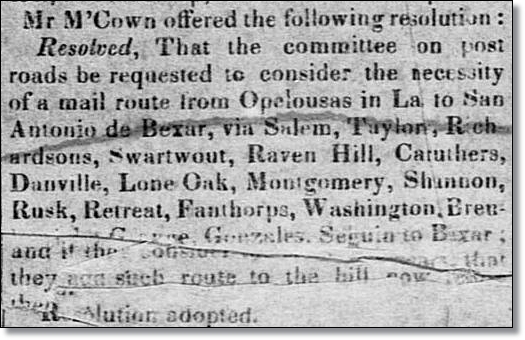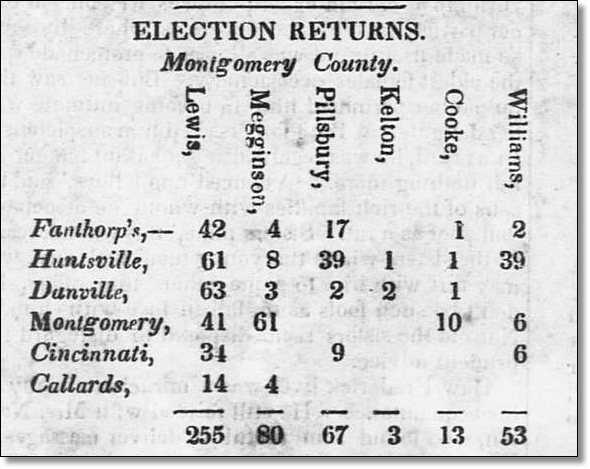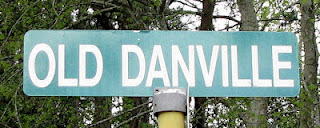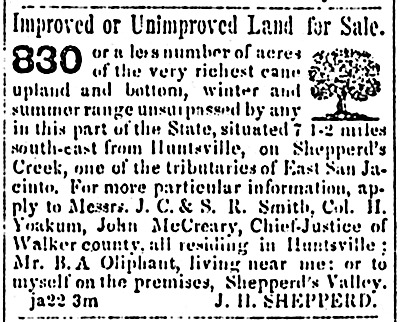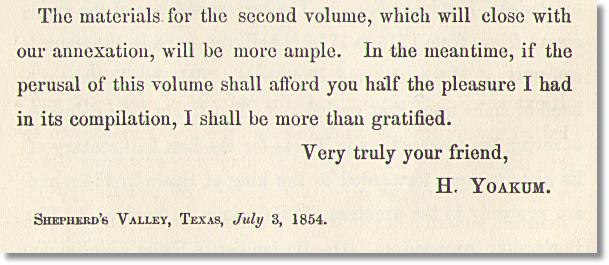
Founding TownsA Shepperd Family Traditionby: Kameron Searle In three consecutive generations, the Shepperd family of Surry County, North Carolina helped found at least three new towns in the North Carolina, the Republic of Texas and the State of Texas. Recent research suggests a fourth.
Jacob Sheppard - Rockford, North Carolina In 1790, Jacob Sheppard was appointed a commissioner of the town of Rockford, Surry County, North Carolina. Chapter LVIII of the Laws of North Carolina - 1790 provides: CHAPTER LVIII.
Note that later we will see a substantial number of similarities between this North Carolina legislative act and the legislative act creating Montgomery County in the Republic of Texas on December 14, 1837. The minutes of the Montgomery County Commissioners Court will also contain similar language. Will of Jacob Sheppard As seen in the will of Jacob Sheppard, his sons William Watters Sheppard and Augustine Henry Sheppard were administrators. Augustine Henry Shepperd was later elected a United States Congressman from North Carolina. William Watters Shepperd moved to Texas as an early settler in 1831 where he would found the Town of Montgomery, Texa in 1837. [Scan Will of Jacob Sheppard]
William Watters Shepperd - Montgomery, Texas
In the Republic of Texas, in July of 1837, William Watters Shepperd in partnership with John Wyatt Moody, the First Auditor of the Republic of Texas, founded the town of Montgomery, Texas. The new town was introduced in an advertisement that ran in July 8, 1837 edition of the Telegraph and Texas Register newspaper published in Houston, Texas. The advertisement had been placed with the Telegraph and Texas Register on July 4, 1837. July 8, 1837 Telegraph and Texas Register For more about William W. Shepperd's extensive role in the founding of the town of Montgomery, Texas see articles on the Indian Trading Post and the Lake Creek Settlement. W. W. Shepperd later sold his interest in the town of Montgomery to James McCown for $4,000. W. W. Shepperd - Carolina, Texas In Montgomery County Texas Deed Book F on page 411, W. W. Shepperd sold two thirds league and ninety acres of land that he bought at the estate sale of John H. Cummings to Edward Bailey and Thomas Gay for $1,140. The sale was witnessed by Charles B. Stewart and B. B. Goodrich on August 28, 1838. The town of Carolina was founded by Edward Bailey and Thomas Gay on this land purchased from W. W. Shepperd. W. W. Shepperd - Danville, Texas I have read several histories of the town of Danville or "Old Danville" as it is often referred to. Danville was located in Montogmery County, Texas. Surprisingly, no one has actually nailed down the year that the town of Danville was founded. One marker has been erected in recent years stating that the town was founded as early as 1833. Other sources report 1838 and 1840 as the dates the town came into existence. There are no primary sources to support any of these dates. Primary sources indicate that the town was founded around 1846. As we will see below, primary historical sources exist to prove Danville was in existence by 1846. The earliest mention of Danville in a primary source that I have been able to locate was in The Texas Democrat newspaper published in Austin, Texas on Saturday, March 21, 1846, Vol. 1, No. 12. page 2. If you are aware of an earlier reference in a primary historical document, please let me know and I will be glad to add it to this page. Below is a scan of the article from The Texas Democrat.
From the March 21, 1846 Edition of The Texas Democrat
So, the name Danville was being used to describe a place along a proposed mail route as early as March 21, 1846. The next primary source that mentions a place called Danville in Montgomery County was the Wednesday, April 8, 1846 edition of the Democratic Telegraph and Texas Register published in Houston, Texas. See Vol. 11, No. 14, page 2. From the April 8, 1846 Edition of Democratic Telegraph and Texas Register The chart above which provided election results for a United States Congressional race was the earliest primary source that William Harley Gandy cited in his 1952 Master's thesis, A History of Montgomery County, Texas. In this chart, a polling place named "Danville" was in existence by April 8, 1846. Though the name Danville was in use in early 1846, there does not seem to have been a physical town in existence at that time. In 1845 and 1846 deeds executed for the sale of land where the town would later be located, there is no mention a town or of a place called Danville as one would expect to find in the deeds. Mention of the town of Danville and lots in the town of Danville would appear in later deeds. It would seem that Danville was a polling place and a post office before it was a town. On August 19, 1847, Daniel Robinson became the first postmaster of Danville, Texas. Daniel Robinson did not have a plat of the town of Danville prepared until July 10, 1848. W. W. Shepperd owned the real estate that contained the lands that became the town of Danville, Texas between 1846 and 1847. See map prepared by Karen Lawless showing W. W. Shepperd's land transactions in and around the town of Danville. Click here to read Journey to Danville by Karen Lawless. This well researched article provides the exact dates that Shepperd purchased the lands in and around the town of Danville.
Old Danville Road Sign Many of the landmark's in the vicinity of what was Danville, Texas, still bear the Shepperd name including Shepard Hill Road, Shepard Hill Cemetery, Shepard Branch and Shepard Lake. See Google map below. The SHEPARD spelling found in these palce names is a misspelling as W. W. Shepperd always signed his name with the spelling SHEPPERD. Intersection of Shepard Hill Road and Old Danville Road
Jacob H. Shepperd - Shepperd's Valley, Texas In 1853, William W. Shepperd's son, Jacob H. Shepperd, founded the community of Shepperd's Valley. As the advertisement below indicates, Shepperd's Valley was located 7 1/2 miles south-east of Huntsville in Walker County, Texas. This advertisement is from page 3 of the January 22, 1853 editon of the Huntsville Item newspaper. Huntsville Item - January 22, 1853
Improved or Unimproved Land for Sale 830 or a less number of acres of the very richest cane upland and bottom, winter and summer range unsurpassed by any in this part of the State, situated 7 1-2 miles sout-east from Huntsville, on Shepperd's Creek, one of the tributaries of East San Jacinto. For more particular information, apply to Messrs. J. C. & S. R. Smith, Col. H. Yoakum, John McCreary, Chief Justice of Walker County, all residing in Huntsville; Mr. B. A. Oliphant, living near me: or to myself on the premises, Shepperd's Valley ja 22 3m J. H. SHEPPERD
Note the name of Col. H. Yoakum listed in the advertisement. This was attorney Henderson Yoakum. Henderson Yoakum moved to Shepperd's Valley and built a home there. He also wrote his two volume History of Texas from Its First Settlement in 1685 to Its Annexation to the United States in 1846 there in 1854 . Yoakum County, Texas, established in 1876, was named after him.
Dedication, Page 4, History of Texas, Vol. I, 1855, by Henderson Yoakum Because of the spelling used in Yoakum's History of Texas, Shepperd's Valley is often seen mispelled as Shepherd's Valley. Jacob Shepperd fought as an officer in the Texas Revolution. He fought in the Battle of Concepción, the Grass Fight and the Siege of Bexar. |
